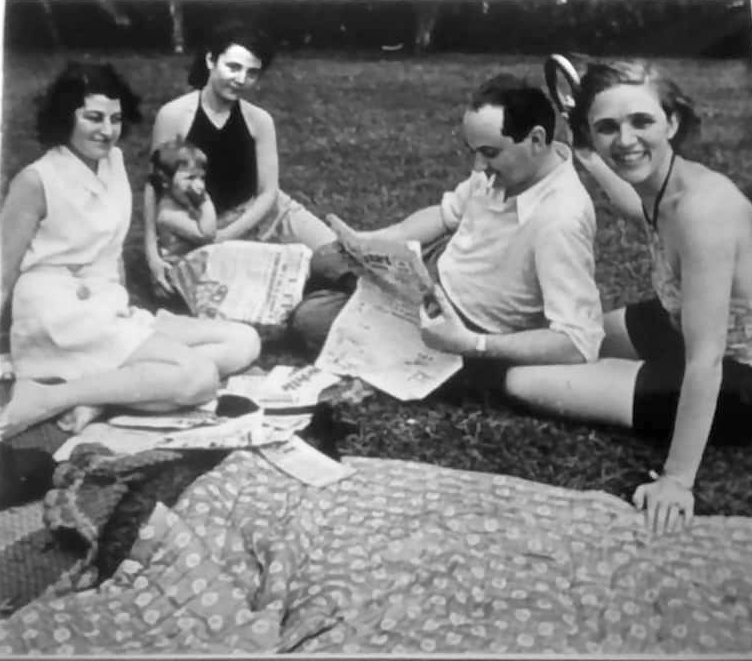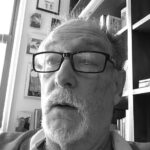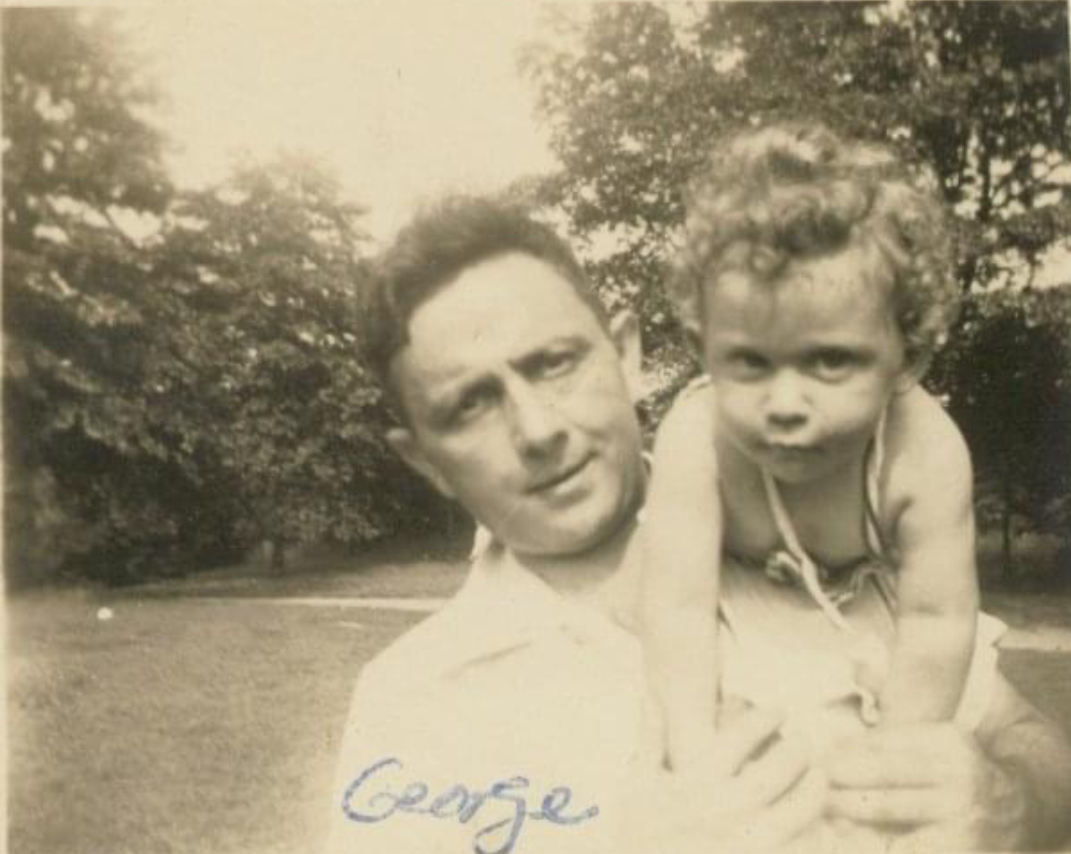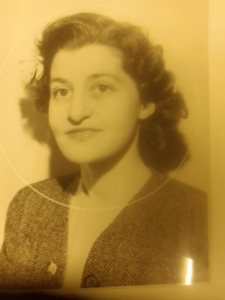Faces of ALBA—Daniel Millstone: “My Parents Didn’t Tone Anything Down.”

Dorothy Loeb, Noelle Newman Gillmor (aka Naomi Dreyfus) holding Ann Rhodes, Chim Seymour, and Ione Rhodes. Central Park, early 1940s. Photo courtesy of Daniel Millstone
Daniel Millstone, a retired attorney in New York City, is the son of George Millstone (1901-1967), a veteran of the Abraham Lincoln Brigade, and Dorothy Loeb (1907-1977), who during the Spanish Civil War worked in France and Spain for the Committee for Spanish Children. A lifelong activist himself, Millstone worked for Students for a Democratic Society (SDS) throughout the 1960s. He is currently a member of the Democratic Socialists of America.
Tell me about your family.
I was born in 1945, in New York City, days before the atom bomb attack on Hiroshima. My mother left her job as labor editor of the Daily Worker just after. She found work doing publicity for the American Social Hygiene Association, the anti-venereal disease outfit. Yet she was fired from that job in 1949 or so after she was targeted for spreading socialized medicine. At Tamiment there’s a lovely letter from an anti-Communist research unit—I’m being sarcastic—explaining how she needed to be stopped. She then worked for many years for the Reform Jewish seminary in NYC, The Hebrew Union College, Jewish Institute of Religion. She ended her working career doing public relations for Planned Parenthood. My father worked in the fur industry for an auction house that was part of the Hudson Bay Co. During a strike, he borrowed money to run a grocery and a laundromat but then went back to fur. His job was to help unload skins from trucks and to sort them for auction.
Did your parents talk about the Spanish war?
Memories of Spain were omnipresent. I heard about it probably before I could talk, and certainly all through my youth. People talked about it all the time. After all, both my mother and father had been in Spain working on behalf of the Republic. My father had volunteered for the Lincolns; my mother, who had been helping to run a Paris-based charity for Spanish children, was sent to Spain to run operations there. Since she had majored in Romance languages, my mother often translated messages for the Vets from Spanish to English and vice versa. My father had been wounded in the war. He had a hole in his arm and the skin had grown around it so you could put your finger through his arm. All the kids were fascinated by it.
So it was not a taboo topic, even during the Cold War?
Not at all. My parents were public Communists, you see. They were not underground. And they did not caution me—at all—about toning down the communism that I was taught from earliest childhood. I’ve met children of Reds growing up in that period who didn’t discover their parents were different until one day they opened the closet and had the Little Lenin Library fall on their heads. Our family was not like that. My parents didn’t tone anything down even though that led to some very bad consequences for me as a kid.
Do you mean in school?
In school and elsewhere. Most obviously, the parents of some of my friends were arrested. The Rosenbergs were executed. Many people lost their jobs because they were Reds. My mother lost hers when I was little. Before I had learned to shut up, I would just open my mouth in school.
What happened?
For example, when I was in second grade, for Negro History Week, in February, I brought Paul Robeson’s record Ballad for Americans to class. But for some reason they wouldn’t play it. I was shocked, indignant—I couldn’t understand why they wouldn’t. Well, that sort of put the teacher on notice that there was something going on there. As a result, I was isolated in the classroom. They put me in the back, away from the other children. When you’re seven years old, that’s less fun than you would think. It certainly left me with a fear of speaking out.
So, then you learned to be more careful…
Yes. My parents’ solution was to have me switch schools. At my next school, there were a lot of other parents who were Reds. Both were public schools, mind you, but one of them was much richer and much more upwardly striving.
Last year, you shared a photograph of your mother sitting in Central Park with the Polish photographer David “Chim” Seymour, who did a lot of work in Civil-War Spain. How did they know each other?
You have to understand that leftist people, especially CP folk in Spain and France who were working on behalf of the Republic, all knew each other. All of the people in that photo I sent you were very close friends. Noelle Newman Gillmor had been married, as Naomi Dreyfus, to Jean-Paul Dreyfus, the filmmaker, who became Jean-Paul Le Chanois. Ione Boulanger Rhodes, from Belgium, and her husband Peter Rhodes, who is not in the photo because he was working in France and Italy with resistance groups, were in charge of the charity.
How did your parents’ relationship to the CP evolve over time?
My mother’s first assignment from the Party on returning to the US from Europe was to explain the Hitler-Stalin Pact to the Hollywood sections of the party. She returned to NYC to the Daily Worker. There she was socially close to the people who made up the Gates faction: John Gates, Alan Max George Charney, Bill Lazarre. My father and mother, who had met in the aftermath of the war, lived with George Charney’s family. Neither parent, though, was in the Gates group. My parents disagreed with the CP decision to give up on the American Labor Party. They favored an independent third electoral party and after they left in ‘57, they found themselves with Annette Rubinstein, Jack McManus and others who tried to create an independent socialist party in New York State.
Where did you go to college?
I went to a small Methodist college in the Midwest called McMurray College—which is now out of business—in Jacksonville, Illinois, where I majored in English literature and philosophy.
Did you join SDS then?
No, I was in a high school group that affiliated with SDS in 1961. But I had been in that for a year or so before the group decided to be an SDS chapter. What inspired me most was the 1960 sit-in in Greensboro. For me, SDS was a very interesting connection. You see, most political activity of young people in the late ‘50s and early ‘60s in New York City was steeped in the most, shall we say, arcane sectarian traditions of the Left. The Trotskyites were against the Communists and the Communists were against the Socialists, and so forth. It was grotesque. But the little group I was in was not quite like that. So it fit very well in with the kind of New Left movement that Al Haber and Tom Hayden were trying to create.
A new Popular Front, so to speak.
I wouldn’t have put it like that, but yes: we were trying to undo the anti-communism that had become a shibboleth-like requirement of the liberals and Social Democrats while not being slavishly associated with the Soviet Union.
In a way, then, you continued in your parents’ political tradition.
Well, only in a way. I never had a chance to discuss this with my father, who died when I was in my early twenties. But my mother, who died in 1977, never once addressed the shortcomings of Stalinism, the Comintern, or even the post-Stalin period in Eastern Europe and the Soviet Union. I’ll tell you an anecdote to illustrate the extent of this. Among the people that my mother knew in Spain quite well were two Comintern agents, Gertrude Duby and Rudolf Feistmann. Both were journalists; Rudi was German and Trudi was Swiss. After Barcelona fell and everyone had to leave as quickly as they could, they all went to France, where Rudi ended up in a concentration camp. To give him a way out, my mother married him. This was after the Germans had already taken Paris. It worked. He got out, divorced my mother, and then met up with Trudi, his girlfriend, who in the meantime had met somebody else and was active helping refugees in Mexico City. When the war was over, Rudi went back to what became East Germany, where he ended up as foreign editor of the official party daily, Neues Deutschland. But then, in 1949, Noel Field, who had worked in refugee aid during the Spanish war for the Unitarians and later defected to the East, was accused of espionage. Rudi was implicated along with many other Jewish veterans of the Spanish Civil War. He “committed suicide” in 1950, presumably helped along. Well, even at this juncture my mother did not seem to have any issues with what was happening. Yet she knew many of the people involved: she knew Arthur London, Rudolf Slánský, and so forth. When London wrote his book The Confession, she said: “It wasn’t right.” But she never drew any conclusions that were critical of the Soviet Union. So, in that sense, I would say that she and I were not on the same page.
Did you see your own activism as a clear departure from your parents’ line?
It was both a continuation and a departure. The very first thing I did independently of them was to go on a youth march for integrated schools. This was 1958—I was 13. The guy who organized that demonstration, which was in Washington DC, was Bayard Rustin, a former communist connected with the Socialist Party. The people I felt most attracted to were connected to Rustin. That left my parents quite puzzled, I think.
In other words, you began tracing your own trajectory early on.
Right. Unlike my parents, I was critical of the Soviet Union. I did not understand why anyone would accept veterans of the Spanish Civil War being bumped off in Eastern Europe.
How active were you within SDS?
Very active. There was a lot of opportunity for organizing adventures. It was a lot of fun.
How do you look back on that period in your life and US history sixty years later?
Well, I’m still doing the same old stuff. I’m in a descendant organization from SDS, the Democratic Socialists of America—in 71, SDS activists who were not Weather underground, Progressive Labor, nor Revolutionary Youth, created a group called the New American Movement, which merged with the Mike Harrington group to form DSA. And I see the same issues and the same divisions coming up in the DSA as we had in SDS. There’s a lot of continuity. If anything, I feel like I’m very much a Johnny One Note. I have this one set of ideas, and they haven’t changed—not enough, perhaps, considering how much the rest of the world has changed.
As a supporter of ALBA, what would you say is the significance of keeping alive the memory of the Spanish Civil War and the International Brigades?
I think it’s important to try to talk about that moment in history—among many others, of course, but that’s one that I happen to have a family affection for. It feels to me like the Spanish war presents a very interesting way of showing a moment where people had to make important, life-or-death decisions. Telling the story of the Brigades and the Spanish Civil War is important because it is an alternative to the history in which everyone is neat and clean and well-advised. In that sense, I don’t think of it as all that different from the histories of the civil rights and anti-Vietnam-war movements. They are all the same sort of struggle.
Sebastiaan Faber, ALBA’s Board Chair, teaches at Oberlin College.















